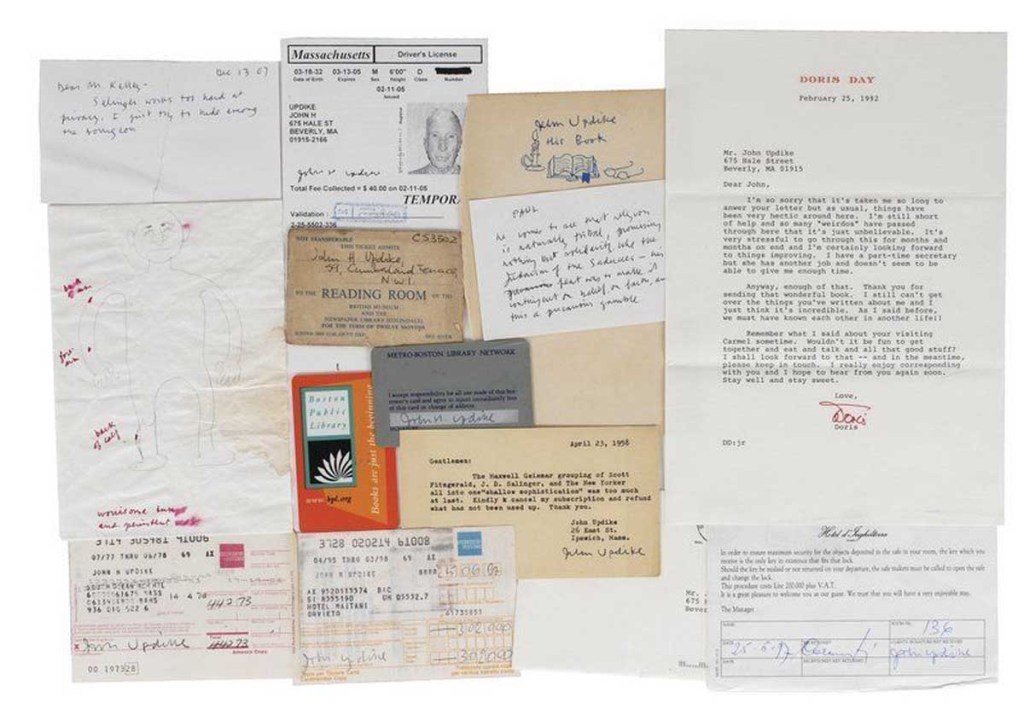Author John Updike’s trash overrated
Published 12:31 pm Tuesday, February 23, 2016

- Courtesy photoA collection of items the late John Updike had intended to throw in the trash is now instead up for auction.
BEVERLY, Massachusetts — Who steals my purse steals trash, according to Shakespeare. But what of the guy who steals your actual trash? Well, he tried unsuccessfully to make as much as $20,000 from the late American novelist John Updike’s rubbish.
Technically, Paul Moran, who carried off bags of Updike’s debris, did not steal it. The law tends to hold that trash doesn’t belong to anyone. Moran began raiding the discarded refuse from Updike’s home in the Boston suburb of Beverly starting in 2006 and continuing until 2009, the year the novelist died at age 76.
Trending
The items Moran collected were boxed and cataloged for sale last week by Boston’s RR Auction. Several bids were made but none came close to the minimum price of $20,000 set by Moran, said Robert Livingston, executive vice president of the auction house.
Livingston said Updike’s trash will be returned to Moran, who now lives in New Hampshire, to do with as he may see fit.
The documents, some going back more than half a century, were offered in a single batch. They included thousands of checks, letters, books (some with notes in the margins), Christmas cards, golf score cards, floppy discs, magazines, doodles, drawings and even love letters from someone named “Joan.”
“I think [Joan] was a woman he was having an affair with,” said Livingston, who describes her letters as “pretty explicit.” Updike, meanwhile, has been called the poet of infidelity for his finely etched tales of suburban marriage and betrayal, including “Couples,” “The Witches of Eastwick” and “Rabbit Run.”
Born and raised in Berks County, Pennsylvania, Updike spent most of his literary life in Ipswich and Beverly Farms on Boston’s North Shore. He got his start as a gifted writer on the Harvard Lampoon magazine while attending Harvard in the 1950s. He published more than 20 novels and twice won the Pulitzer Prize for fiction for “Rabbit is Rich” and “Rabbit at Rest.” He was also a poet, a short story writer and an art and literary critic.
Livingston describes Updike’s trash as an opportunity for literary scholars and fans to learn more about a man who was forever on the short list for the Nobel Prize for Literature. He disputes the notion there’s anything sleazy about auctioning off Updike’s odds and ends.
Trending
“It’s part of history,” Livingston told The Salem, Massachusetts, News, adding there is nothing Updike would be embarrassed about. “His family was aware that Moran was putting together this archive.”
The archive includes two typed letters from actress Doris Day, a fan of Updike’s just as he was ironically a declared fan of 1960 America’s symbol of celluloid sexual propriety.
Moran began collecting the trash after bicycling past the author’s house and seeing him deposit two plastic bags. According to a 2014 article in The Atlantic, Moran next hatched the idea of pedaling back and preserving those bags of trash as well as subsequent drop-offs.
“And thank God he did,” said Livingston. “It saved a part of an incredible author’s life.”
“It’s bizarre,” laughed Julia Glass, a National Book Award winning novelist from the nearby suburb of Marblehead. “How completely weird.” She pointed out she isn’t as famous as Updike, but added, “Scavengers are welcome to rummage through my trash. All they’ll find are old magazines and circulars from Trader Joe’s.”
Modern writers are less likely to have what they’ve tossed come back at them, Glass suggested. In addition to the reliance on easily wiped digital media, she said, writers tend to be “paranoid about paper. You have to shred it.”
That’s exactly what fellow Marblehead author Eric Jay Dolin does. “Anything I think is sensitive, I will shred it. Or tear it into small pieces,” he said.
Dolin acknowledges the benefits of further understanding the life of a writer as important as Updike, but that doesn’t sooth his unease. “If somebody throws something out in the trash, they mean it not to be seen. I find it distasteful and a little bit immoral.”
Dolin, whose latest book — on the history of American lighthouses — is due out in April, conceded that celebrities expect to be probed. “I’m sure there are people who would love to go through some famous actors’ trash,” he said. But having it actually happen in suburban Boston with Updike “seems a little bit trashy,” said Dolin.
“Who steals my purse steals trash,” says Iago in Shakespeare’s Othello, “But he that filches from me my good name, robs me of that which not enriches him, and makes me poor indeed.”
For his part, Livingston expressed confidence Updike’s good name will not be lost in his trash.
Alan Burke is a reporter for The Salem, Massachusetts, News. Contact him at aburke@salemnews.com


